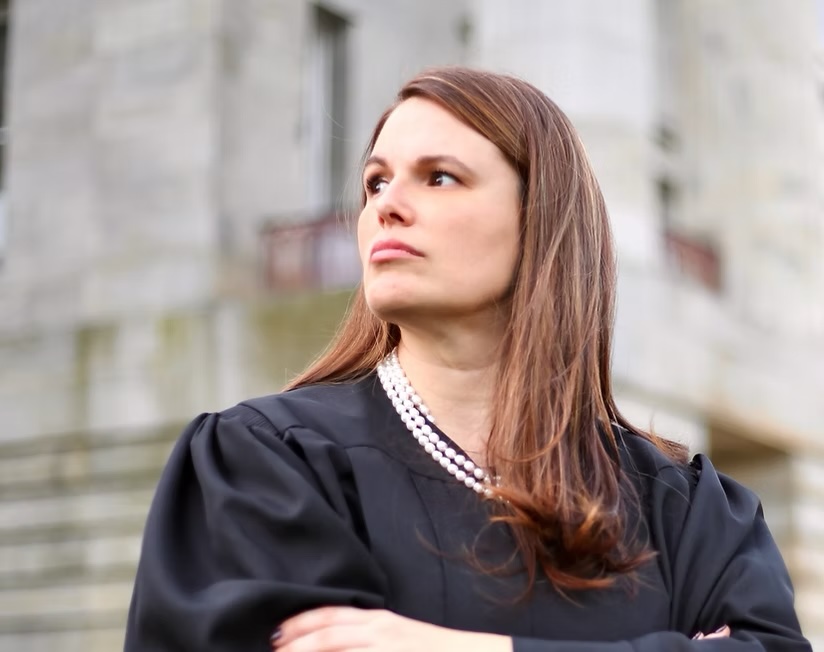Allison Riggs: ‘This Is a Fight for the Very Soul of Democracy’

The North Carolina appeals court’s decision in Republican challenges against incumbent Democratic Justice Allison Riggs’ victory in the state’s Supreme Court race last year is “like dropping a match in a really dry forest,” she told told Democracy Docket founder Marc Elias in an interview Friday.
“This does not just affect North Carolina,” Riggs said. “This is like dropping a match in a really dry forest. And if we let this kind of anti-democratic effort take hold, we will not be able to contain it. So this is a fight for the very soul of democracy. Today’s decision was deeply misinformed.”
Riggs is the Democratic incumbent in the race for a state Supreme Court seat. After she narrowly won the race, her Republican opponent, Judge Jefferson Griffin, challenged tens of thousands of votes.
By a 2-1 vote, a three-judge panel — composed of two Republican judges and a Democratic judge — overturned a lower-court ruling dismissing the challenges. The panel invalidated the votes of around 60,000 people unless they fix ballot or registration errors that were made by election officials.
Riggs has said she plans to appeal the decision to the North Carolina Supreme Court.
Responses have been edited for style and clarity.
Marc Elias: Justice Riggs, could you give people an update on how you see the ruling as the candidate?
Justice Allison Riggs: Today’s decision was deeply misinformed and I will promptly appeal it. But I want folks to know, I think this fight ends in federal court. I’ve been telling people that all along.
I have been very careful in my state court participation to make sure that all of the parties and all of the courts know that I reserve all of my rights to go fight this fight in federal court, to vindicate the federal rights that voters have under federal law and the federal Constitution. I knew this wasn’t going to be easy and I knew this wasn’t going to end quickly.
What I can tell you is, as someone who understands the history and the people who have bled and died for the precious right to vote, I stand on their shoulders. I did as a former voting rights attorney. I do now as a judicial officer. And I took an oath, a solemn oath to defend the constitutional rights of the people who participate in the political process here in North Carolina.
I will not give an inch. I will continue to stand up for voters and stand in the way.
Our courts need to be filled with people of strong constitutional conviction who put people over politics and are willing to enforce the law without fear or favor.
We know that justice is not for sale and that people understand now the importance of putting people who will enforce the Constitution and defend the rights of the people on the bench.
If people in power can decide that an election result stands only if they like who wins, then nothing that we depend on for our rights, our freedoms, our liberties, good governance, none of that works if that basic tool gets broken. So this is a fight for this entire country.
It’s the government tossing ballots after an election when people did everything that was asked of them.
ME: Maybe you could just do a little bit of lay of the land because I know there was a case that actually went to the Supreme Court of North Carolina and how does that fit into this? There have been federal court cases and how do those fit into this? So maybe you can just orient people who are coming at this.
AR: Yeah, it’s complicated and it’s been a wild five months. For the better part of December into January, we had dual track litigation. State court litigation, my opponent wanted state courts to decide this issue.
The state board and me and voters that you represent, we’ve been in federal court arguing that federal courts need to decide these issues because federal law that is designed to help voters register and vote, federal law that is designed to help military voters vote because it is hard to serve in the military or be in a military family and cast a ballot.
These laws will be violated and our federal equal protection and substantive due process guarantees would be violated by what my opponent seeks.
What happened in February was the federal court said, essentially out of respect for the state court, we’re going to let the state court proceedings play out. State courts can decide questions of state law. But for federal questions, if they’re still implicated by whatever the state court rules, we’ll come back to it. The wonky words are, we’ll retain jurisdiction. We’ll take this back up.
After the state court proceedings, what that meant from a timing perspective is that it was going to take longer. We had to ride out this state court process. So I won in the state board, the agency that makes the first determination. I won in a trial court.
Today, the court of appeals reversed both of those bodies and laid the groundwork to not only disenfranchise voters but they’ve also opened the door for any disappointed politician to absolutely sow an unimaginable amount of chaos post-election if they don’t like the outcome.